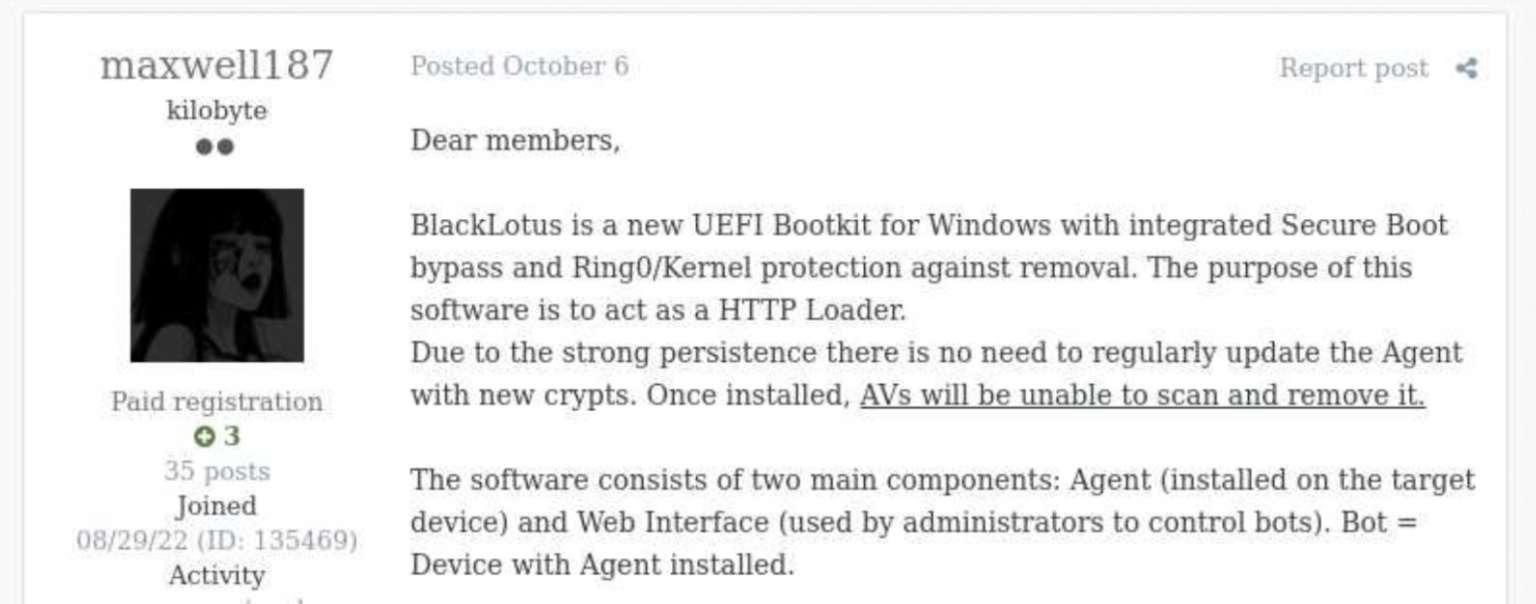The source code for the BlackLotus UEFI bootkit, which was previously sold on the dark web for $5,000, has been discovered by Binarly analysts on GitHub. The researchers say the leaked sources are not entirely complete and contain mostly a rootkit and a bootkit to bypass Secure Boot.
What is BlackLotus bootkit?
BlackLotus was first spotted in October 2022. Its seller claimed that the bootkit had a built-in Secure Boot bypass, built-in Ring0/Kernel deletion protection, and also ran in recovery mode and safe mode. The malware is equipped with anti-virtualization, anti-debugging and obfuscation, which complicates its detection and analysis. Also, according to the seller, the security software cannot detect and destroy the bootkit, since it runs under the SYSTEM account inside a legitimate process.

In addition, BlackLotus is able to disable security mechanisms on target machines, including Hypervisor-Protected Code Integrity (HVCI) and Windows Defender, as well as bypass User Account Control (UAC). The payload has a size of 80 kilobytes, is written in assembler and C, and it can determine the geofence of the victim in order to avoid infecting machines in the CIS countries. Last year, the malware was offered for sale for $5,000, with each new version priced at another $200.
Later, the threat was studied by analysts from ESET. They confirmed that the bootkit easily bypasses Secure Boot and uses the Baton Drop vulnerability (CVE-2022-21894) from a year ago to gain a foothold in the system.
How does the exploit work?
It was highlighted that Microsoft fixed this issue back in January 2022, but attackers can still exploit it because the affected signed binaries were not added to the revocation list. According to analysts, BlackLotus is the first documented case of abuse of this vulnerability.
Later, Microsoft experts, during the analysis of devices compromised with BlackLotus, identified a number of features that make it possible to detect infection and described in detail possible indicators of compromise.
They also discovered that BlackLotus exploits another vulnerability, CVE-2023-24932, which is also related to bypassing Secure Boot protection. Although the bug was fixed in May of this year, this update was disabled by default, and Microsoft required Windows users to perform a very complicated manual installation of this fix.
Since the company warned that installing the patch incorrectly could cause Windows to stop starting and could not be restored even from installation media, many people chose not to install the patches, leaving devices vulnerable to attacks.
BlackLotus UEFI Bootkit Leaked to the GitHub
As Binarly experts now say, the BlackLotus source code was leaked to GitHub by a user under the nickname Yukari. He writes that the source code has been changed and no longer exploits the Baton Drop vulnerability. Instead, BlackLotus uses the bootlicker UEFI rootkit, which is based on the CosmicStrand, MoonBounce, and ESPECTRE UEFI APT rootkits.

He explains that the methods used in the bootkit are no longer new, but leaking the source code would allow attackers to easily combine the bootkit with new vulnerabilities, both known and unknown.
Since the BlackLotus UEFI Bootkit source code is now available to everyone, it is possible that with its help hackers will be able to create more powerful malware that can bypass existing and future measures to counter such threats.




